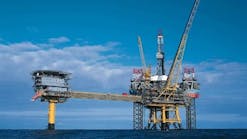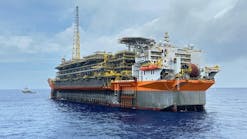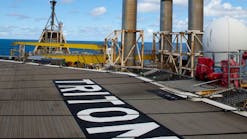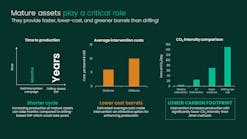Victor Schmidt
Houston
Oil supply, demand not adding up
The International Energy Agency (IEA) Monthly Oil Report was unable to confirm an expected stockbuild of over 3.5 million b/d that was anticipated at the end of the first quarter. The "Riyadh Understanding" was to remove around half of this potential oversupply. IEA expected an aggregate build of 1.4 million b/d over the first quarter. However, OECD data indicates there is no excess supply going into the second quarter, but that a net reduction of about 1 million b/d occurred.The agency suggests two factors may be influencing the numbers: the impact of paper markets, and downstream inventory cycles. The paper markets became oversold in March because of pessimism, and secondary oil stock movements may have understated first quarter demand. The full effect of the "Riyadh Understanding" will become more apparent later in the year.
Deepest gas pipeline
DNV and Gasprom have contracted to build the world's deepest gas pipeline across the Black Sea. The line will connect Isobilnoye, Russia to Ankara, Turkey and reach to 2,100 meters water depth. The pipeline is scheduled for completion by 2000.Russia prepares to divide the sea
Russia and Kazakhstan have prepared a treaty dividing the Caspian Sea seabed into national sectors. This is a major change in the Russian position, which originally wanted all the resources to be held and shared by the littoral states: Russia, Kazakhstan, Turkmenistan, Iran and Azerbaijan. The treaty signing is scheduled for July 1.Caspian Basin "rent" battle study
The James A. Baker III Institute for Public Policy at Rice University (Houston) completed a year-long study of the Caspian Basin and its energy issues. The report, entitled "Unlocking the Assets: Energy and the Future of Central Asia and the Caucasus," explores the cultural, social, economic and political dynamics that might affect the development of oil and natural gas from the Caspian Basin. Key policy recommendations include:- Encouraging inclusivity instead of competition.
- Reassessment of multiple pipeline routing.
- The Turkish Thrace pipeline is more economic than the overland Baku-Ceyhan route.
- American interest is likely to be case-specific.
- Disparity between the rich and poor, combined with corruption, will hinder the potential for increased oil and gas revenues to promote stability.
- Government sponsored social equity funds should be established.
- Russia and the United States should encourage regional arms control agreements to prevent an arms race fueled by energy income.
- Russia should be supported in its efforts to resolve conflicts in the region.
- Greater international attention could be helpful in building a stable, liberal Russia.
- Russia faces an array of internal divisions.
- Multilateral peace efforts should be pursued in Nagorno-Karabakh.
- The US should review policy toward Iran and reassess the effect of current sanctions on the development of Caspian energy resources.
Money follows policy
Turkmenistan is striving to develop its petroleum resources, especially gas, but is being pressured by the US government to avoid developing business relations and additional pipelines with Iran. Earlier this year, the nation opened a short gas pipeline to feed demand in northern Iran. The potential exists for this line to be extended south into Iran, perhaps to the Persian Gulf.The US prefers that Turkmenistan build gas pipelines west across the Caspian Sea to feed European markets. The secondary effect is to limit economic control and power that Iran might exercise over Turkmenistan. To its credit, the US has backed its proposal with US$750,000 to study potential Caspian routes. The US funding follows an Iranian route study, which is funded by Turkmenistan and being executed by Royal Dutch/Shell.
Oil swaps are another option being implemented. Turkmenistan is already swapping 250,000 b/d of crude per day with Iran. Iranian crude oil is shipped from the Persian Gulf for Turkmenistan accounts in exchange for Turkmenistan delivering crude to northern Iranian refineries. This is an ideal way for the land-locked nation to generate export earnings in advance of new pipeline building.
Turkmenistan's central location will likely require other pipeline routes in addition to its northern pipeline connections with Russia. Economics and politics continue to simmer in Central Asia.
Equal treatment?
Will biomass and other hydrocarbon substitutes be subject to the same taxes based on their "greenhouse" gas contribution? The European community is strongly in favor of neutralizing the effect of "greenhouse gases" and is strongly in favor of developing alternative energy sources.Some of these alternative sources also produce "greenhouse" gases, carbon dioxide among others. Most governments in the region are in favor of increasing taxes on petroleum or creating new taxes on combustion byproducts. Sweden already has taxes on carbon dioxide production.
Britain's development of biomass for electical power generation makes an interesting point (Financial Times; April 16). Chicken waste is combined as a "fuel" with fluidized bed combustion. According to the report, chicken waste is a "clean" fuel, cleaner than coal, and generates useful phosphate fertilizer as a byproduct. However, the questions remains:
- Will biomass and other hydrocarbon substitutes be subjected to the same taxes based on their "greenhouse" gas contribution?
- Will uncontained methane releases from chicken waste be taxed in addition to the carbon dioxide and other byproducts, that burning produces?
Copyright 1998 Oil & Gas Journal. All Rights Reserved.




